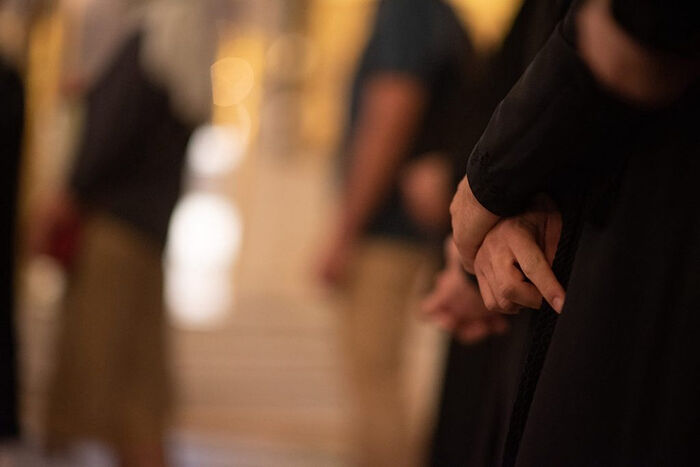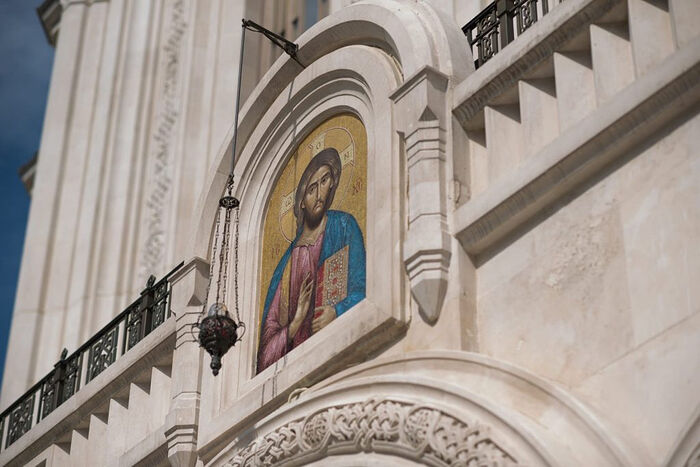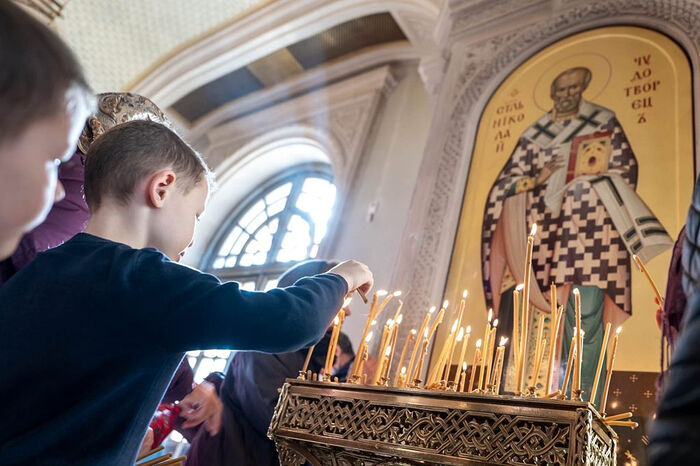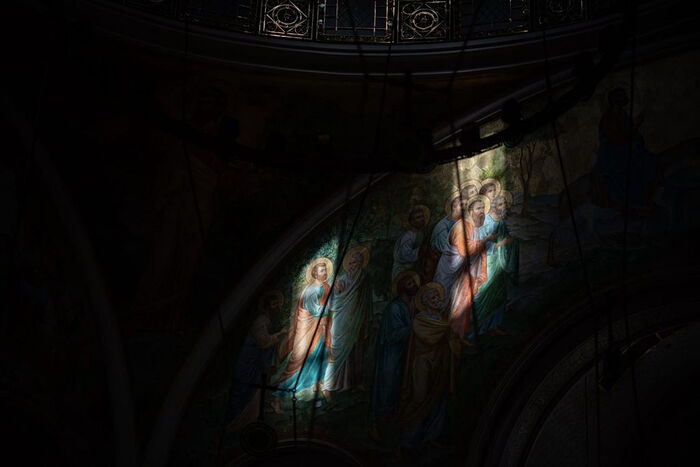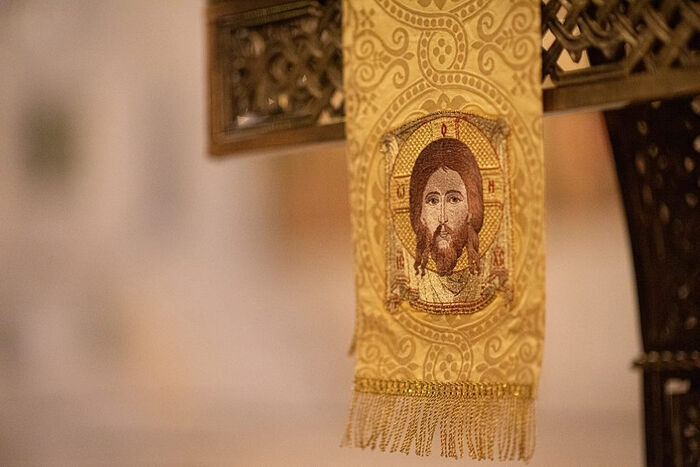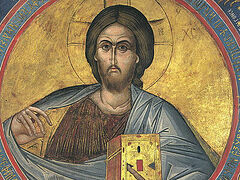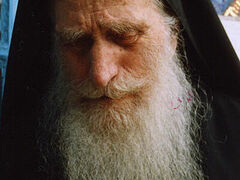I happened to witness an unusual scene at an annual festival of academics and theologians. Many people gathered for the Vigil; the Church of Holy Martyr Tatiana in the Moscow State University was packed, and people were even praying outside. And outside the church doors, in the crowd, was standing a man of simple appearance who was in the Spirit (I am telling this to those who saw and understand it).
It was awe-inspiring yet wonderful: not in the altar or on the solea, but in the crowd in front of the church entrance. Not among hierarchs and priests, not in the company if eminent theologians and academics (as one would expect), but in the crush in front of the church doors.
When he was leaving, I happened to hear a monk collecting donations quietly address him with awe: “Brother, tell me for God’s sake, what you have done before God? For I can see without a doubt that you are in the Spirit.” The modestly dressed man answered: “Believe me, brother, that I don’t know of any good deeds of mine. I’m just standing at the service, clearly understanding that I am worse than all those present. No matter who I look at, I realize I’m definitely worse than him.” And he left.
I confess that I know this man. And I know something more about him than what he told the monk (he talked about his experience of grace, when a person really feels he’s worse and more contemptible than everyone else, but he didn’t say how he had acquired that state, since one shouldn’t talk about oneself). It would be good to tell his story to ascetics, but if any man be ignorant, let him be ignorant (1 Cor. 14:38).
We studied together with him at the Department of pastoral Theology of an Orthodox university, but he is older than me, more mature and not like me—he was already receiving his third higher education. I really like his path, though to each his own. Happiness is not at all in having a lot of money, honors or power, but in finding your calling. Whoever finds his mission is happy!
At the beginning and in the process of training everything went smoothly for him. But closer to the end troubles, sorrows and trials befell him. Not only did he have a very heavy cross in his family, not only did they suddenly not give him the green light in his secular work, but at the university too—although he wrote an interesting thesis, he was not allowed to bring a single page to the academic council. Envy is a terrible human disease. The Gospel tells us about it; St. Gregory the Theologian wrote much about jealous people; and other Holy Fathers wrote about this, knowing that after them there would be other people who would have to be strengthened in sorrows. Perhaps that’s why they committed their bitter thoughts and feelings to paper—so it might be easier for those after them.
He came unto his own, and his own received him not (Jn. 1:11). How bitter this gospel verse is! But even in such a situation the Lord left an example of how His followers should act: He is brought as a lamb to the slaughter, and as a sheep before her shearers is dumb, so He openeth not his mouth (Is. 53:7). Let us go forth therefore unto Him without the camp, bearing His reproach. For here have we no continuing city, but we seek one to come (Heb. 13:13-14).
Theology only begins where the cross is. What is theology without the cross, persecution, and love of the cross? After all, you can rejoice, walking along the great and terrible path of love and suffering, following Christ. Take My yoke upon you, and learn of Me; for I am meek and lowly in heart: and ye shall find rest unto your souls (Mt. 11:29).
This servant of God is not lost, and he often smiles, saying, “I deserve worse for my vanity and arrogance!” The Lord loves and strengthens him. What else does one need? Only the Lord love you, not leave you and give to you according to your heart—while everything earthly is fickle, vain, deceptive and fleeting. The Lord gave this inconspicuous ascetic an amazingly interesting task, put bright thoughts in his heart, and opened to him a special path. He does not work among clergymen, theologians or academics, but lives the ordinary life of ordinary working people.
How the Russian people love the ascetic life! How close and dear to them is the path of “the abbot of the Russian land” (St. Sergius of Radonezh)! They also loves the ascetic labors of “poor” Seraphim of Sarov (as the saint called himself), who embodied the ideal of Russian holiness.
But now times are different! How can one imitate their eremitic life of stillness with the incessant noise of cars, when there are no longer any impenetrable forests, and everywhere are planes and helicopters? In an age of unprecedented pride and ambition, and with the shortage of experienced spiritual mentors, we are saved mainly by humble patience in troubles and sorrows, by sincere thanksgiving to God for everything, being burdened with infirmities, crosses and illnesses.
St. Ignatius (Brianchaninov) wrote over 150 years ago: “At present in our fatherland, the eremitic life in the wilderness can be considered absolutely impossible, and seclusion is very complicated because it is more dangerous and more incompatible [with our modern life] than ever. In this we must see the will of God and obey it.”
What ascetic labors can we perform for Christ’s sake amid the hustle and bustle of city life? How can we acquire here the grace of the Holy Spirit, which regenerates and enlightens us?
We have always loved the path of another marvelous saint, available to everyone in all times: St. Nicholas the Wonderworker, the protector, helper and patron of the oppressed, offended and suffering, who dedicated his life to acts of mercy and compassion. Anyone in the city can imitate him. Love God and people, love the Church and clergy, attend services, bear your cross, and most importantly, perform good deeds secretly and without being noticed. Such feats are loved by everyone, from young to old.
Hasten to do good for Christ’s sake! Life is short, and we do very, very few good deeds! The world is getting closer to its end, and there is ever less love in it. In the lack of love our hearts harden, become cruel and dead. Therefore, the All-Merciful Lord sends us various reasons for works of mercy and charity so that we can be saved—ever more poor, sick and afflicted people are appearing in our times. Before His Passion on the Cross the Lord said very simple, important and clear words: Then shall the King say unto them on His right hand, Come, ye blessed of My Father, inherit the Kingdom prepared for you from the foundation of the world: For I was an hungred, and ye gave Me meat: I was thirsty, and ye gave Me drink: I was a stranger, and ye took Me in: Naked, and ye clothed Me: I was sick, and ye visited Me: I was in prison, and ye came unto Me (Mt. 25:34-36).
Such deeds are undoubtedly more important than the books we write. What use is my book to someone who is seriously suffering, ill, exhausted or freezing, whose soul is more precious than all the riches of the world, gazing at me with a pleading look? He needs a kind human word, compassion, a piece of warm bread, and help. Does he care about lofty words in my book, if I just pass him by, without giving him anything or helping him in any way? If I write for people but shield my soul from them, passing by suffering and grief; if my neighbor cannot rely on me in a difficult moment in life—what are my “love of God”, “theology” and beautifully printed pages covered with letters for?
So, I look secretly out of the window of the tram I’m riding, when I see someone helping unfortunate people. I am learning not to be ashamed of such things—I like this path. And I take comfort in seeing how many people in Moscow still have kind hearts. So, it’s still not the end!
My aforementioned ex-fellow student and I live in the same neighborhood, from the streets of which you can see Moscow State University. I know that these works of charity are his ascetic labors. Now in the chilling autumn cold I see him leading a hobbling one-armed disabled man, their arms around each other in embrace; then I see him standing pale, next to an ambulance, asking them to take a dying homeless man, whose smell could be discerned even through the windows of my bus. Once I noticed him in a sharp frost near a bar next to an unfortunate man lying on the sidewalk at a traffic light, with crowds of people moving past him. Such a case is familiar to me—it is not easy, it’s terrible because people are rushing past, thinking on the go that in such a crowded place someone must have called an ambulance. An unfortunate, freezing person can lie for hours without any help, right before everyone’s eyes.
Once a beggar lying near a subway asked me for help, stretching out his trembling hands to me, imploring me not to leave him now. I, a sinner, thought that it would be enough to give him some bread or money as here someone was sure to help him. I ran on so as not to be late for the service. A few days later I myself was lying ill at night in bed, and with the same plaintive cry for help, remembering the imploring beggar and repeating in a whisper to myself: “Don’t do to your neighbor what you don’t want done to yourself!”, But no one heard me. Many times my cold inattention and mercilessness returned to me. Whoso stoppeth his ears at the cry of the poor, he also shall cry himself, but shall not be heard (Prov. 21:13). Once in November, I, a miserable “writer”, was running home to finish a chapter when a chilled cripple, near whom a student was standing, tearfully asked to be taken into a warm entrance. But I decided that the student alone would cope with him. A few days later I burned with shame learning that the student had been confused, and the unfortunate cripple had lain all night long on the wet street. What can I say about myself? My mother taught me from childhood by her own example to do good deeds without thinking of others’ opinions or pitying myself, but I am still very, very far from being able to deny myself as the Lord wants me to do.
My older fellow student and ascetic, who was already quite mature in spirit, apparently comprehends the essence of sublime theology. Although this is “street” theology associated with dirt and bad smells. However, it was awe-inspiring and astonishing to see him later, although late for the service, but in the Spirit, the grace of God clearly with him!
He has comprehended something much higher than our endless meetings in councils, where eminent-looking men in fine clothes prevail, and the florid speeches of speakers who love good food are heard. He is much closer on his path to the great Apostle John the Theologian, who in his declining years used to say these words: Beloved, let us love one another (1 Jn. 4:7). He is closer in spirit to St. Gregory the Theologian, who refused the Patriarchate for the sake of peace in the Church, and to St. Simeon the New Theologian in his sorrows and hardships. He is much closer to this than us, his former fellow students, who are still proud of our knowledge. The Apostle Paul writes: Knowledge puffeth up, but charity edifieth (1 Cor. 8:1).
He is wary of any public theological meetings, where it is so easy to lose the grace of the Holy Spirit in disputes, in the slightest movements of condemnation and envy. He quietly labors in one of the Moscow churches of St. Nicholas the Wonderworker, bearing his life’s crosses, trying to rejoice always.
Is he right? When I began to think seriously about all this, I suddenly clearly understood: It is impossible to imagine Apostle John the Theologian submitting his synopsis of the Apocalypse to a conference, or St. Maximus the Confessor reading out his 400 Chapters on Love at an academic platform, or St. Gregory Palamas standing with a piece of chalk in his hand at a blackboard or counting royalties in journals. Their paths were absolutely different: exile to an island, confession of faith and prison, solitary life, slander, distrust and denunciation. It’s time for us to grow up!
I once heard from this fellow student of mine that while it’s very good at the theological and university festivals at our church services, with the Patriarch, bishops and clergy, where there are many believers and everything is very festive; but it’s a totally different and special thing when you say a kind word from the bottom of your heart to an emaciated old beggar picked up on his penultimate journey by an ambulance; when you console a fifty-year-old homeless man beaten by teenagers in a stairwell, wrapping him in a scarf to keep him warmer; or when you pull a tipsy man out of a snowdrift. Then love, the cross, and the Lord are very close. There is such joy in your soul! You come home, and you don’t know how you suddenly start writing page after page! When your net begins to tear, as was the case with the Apostle Peter. And all that remains is to fall at the Lord’s feet and say: Depart from me; for I am a sinful man, O Lord (Lk. 5:8).
Monarchs have also noted the extraordinary dignity of this path! Once Tsar Nicholas I with his personal doctor spent nearly an hour administering artificial respiration to a man who had nearly drowned in a city pond, and whom they managed to revive. He recalled this incident all his life, saying that he had never experienced such joy again.
Here it is—the path suitable for ascetics of the end times, so necessary and hardly noticeable in the “desert” of the hustle and bustle of a populous megalopolis, where everything changes every minute, where grief is seen at every step, and where mercy and love are so needed!
We are touched when we read the words from the akathist to Blessed Xenia of St. Petersburg, a contemporary of Mikhail Vasilievich Lomonosov1: “Amidst the vanity of the great city thou didst live like a desert-dweller, unceasingly offering up thy prayers to God...” (Ikos 2). We admire St. Gerasimos, who removed a sharp thorn from a roaring lion’s paw. But there are bottles broken into tiny slivers on the pavement under the feet of children and city dogs. What prevents us from developing dispassion in ourselves before the opinions of others and showing true love in practice, removing sharp pieces of glass from the road? If St. Gerasimos had pity on a lion, would he not have pitied small children and dogs? What about other saints? Only good deeds can reduce the amount of evil in the world. If at the same time we pray for those who know not what they do (Lk. 23:34), it will be possible to continue to live in this world!
Our Lord is omnipotent. He Himself can help all the suffering and needy in an instant. But in the end times He entrusts them to us with a great purpose, as St. John Chrysostom wrote: so that love would be kindled in the world, so that mercy and compassion would not ebb away in us.
If no one cares about the suffering and unfortunate, the Lord will send them angels and saints, or will Himself come to them and take them. That’s easy for Him. But what will we be left with? With a cold, hardened heart of stone, renouncing the love and grace of God?
“We must be merciful to the poor and strangers; the great luminaries and Church Fathers cared very much about them. With regard to this virtue, we must try by all means to fulfill the following commandment of God: Be ye therefore merciful, as your Father also is merciful (Lk. 6:36); also: I will have mercy, and not sacrifice (Mt. 9:13). The wise heed these saving words, but the foolish do not; thus, the reward will not be the same,” St. Seraphim of Sarov teaches. “He who loves God and does not consider anything worthy in comparison to love of God and neighbor has come to know both the depths of God and the mysteries of His Kingdom—as befits one who is moved by the Spirit of God, and is known by God as a true worker of the Paradise of His Church; who through love will do the will of God,” wrote the Venerable Niketas Stethatos.

